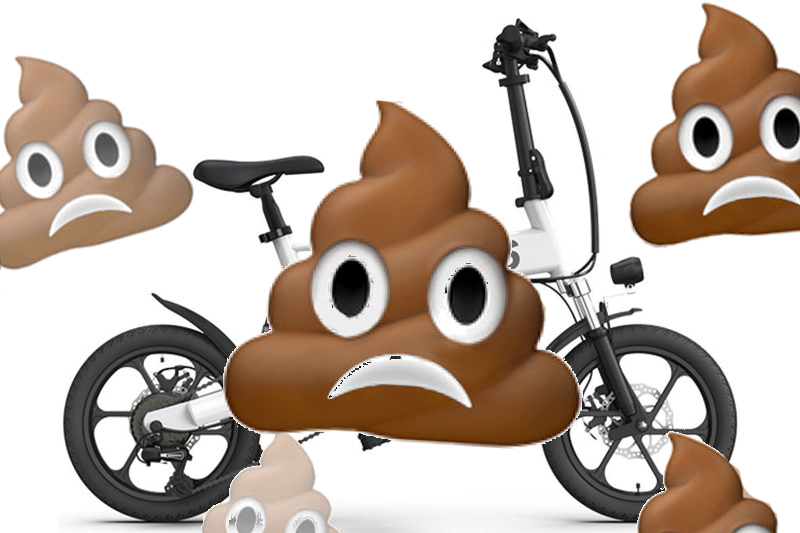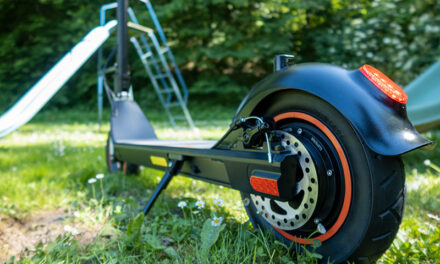
Chinese bicycle, Chinese scooter, can I buy it?

The article reflects my own opinion, but maybe that counts for something.

contents show
Introductory
I had to write this article because the medicine is slowly rolling away from the many annoying comments in which the 200 scooter and the 300 bike are held accountable as to why they are not built from the same parts as the 600 and one million machines. I feel that it is completely unnecessary to explain this, as it only takes a little insight for everyone to realize the reason.
However, this does not work. With every single product like this, there is discussion, banter, accountability, why the brakes are cheap, the gearbox is dog-eared, whatever. Well, I'm trying to get around this question now, weaving in my many years of experience. I'm writing it just because I don't want to argue with anyone after this. I'll link this text, and that's it.
It goes bad, it doesn't go bad, it's all shit
What objections do I get?
- The gearbox is on the bottom shelf, it cannot withstand the load due to the electric drive
- The brake is on the bottom shelf, you can't stop with it
- The frame breaks
- The battery is made of noname cells and cannot be repaired
- The shock absorber (based on the photos, as well as looking at it) sucks
- You just have to look at it, it's all crap
- It will fall apart after 100 kilometers
- The service will cost more than the scooter/bicycle, it is not worth having it repaired
Where do I start. In the past, I had an argument with a service technician who stated that they don't deal with Chinese crap, they drive customers away because it's not worth dealing with them, the repair is more expensive than the machine. In addition, he kept mentioning how impossible it is to repair the broken frame, because the design is crap, the cables run around the neck.
I don't argue with the latter, I've also seen one where the cables ran around the neck. Although, not with the scooters I've had recently, but that's the way it is. There is also such and such.
It's not worth fixing. Well, that's a good question. The fact is that the scooter has a price, for which we buy it in the store. This is somewhere between 200-350 thousand forints for the Chinese, not looking at the power machines. For the branded machines, 400+ thousand, but more in the 600 thousand category, to which they say, well, this is a good scooter. I don't even argue with that, the more expensive is better, the question is whether it is better by as much as it costs more.
However, it is a matter of fact that whether or not the repair is worth it is greatly influenced by the price. If you buy a scooter for 600 and the service says that it will be repaired for 200, there is a good chance that you will nod. If you buy a scooter for 200 and the service says that the repair is 200, then you curse one and buy another, new one.
You can decide who did better. The one who bought a scooter for 600, spent 200 on it and has a repaired but branded scooter for 800, or the one who has a Chinese one, but it's brand new, and the whole thing cost 400. I won't decide for you which is the better case, I'm just saying on my own behalf that I would stay with the Chinese one, because I'll buy two more fat new ones from the remaining 400 difference, if necessary. But you don't have to.
I don't argue with the broken frame and the use of materials. It is clear that cheap Chinese is not cheap because the Chinese want to give us gifts, but because there is less material in it.
I also often hear from the service people that they bring much more bad things from the Chinese. Well, this is not surprising, because where I go approx. There is a 10-to-1 ratio of branded, say more expensive Xiaomis and Xiaomi clones. So, it would be strange if an equal amount of them went bad. Of course, it is another matter what the ratio is for the machines sold, say how many out of 100 break down within a year while the warranty lasts.
Let's say a more expensive Xiaomi breaks 100 out of 1. Is that a good ratio? Yes! 100 out of 5 of the cheap Chinese ones break. Quite a lot of sales go through me, since I usually help customers with warranty administration, I have a rough idea of how many break. I don't think you have 100 out of 5, but let's say you do.
Is this a bad ratio? Of course, because it deteriorates five times as much as the more expensive one. But is 100 out of 5 that many? Not so much, especially since the majority of errors will not be frame breaks or battery short-circuits.
As for the battery, many people say that you shouldn't buy a Chinese one because the battery sucks. Well, on the one hand, this is no longer true, most manufacturers have moved towards quality cells in the last 1-2 years. On the other hand, the battery can be repaired, you just need to find a normal service person who is not afraid to get his hands dirty and is not willing to repair something only if he can get a new part from an antistatic bag, for which you do not have to go further than the warehouse in the next room.
Another reason not to buy is that there are no spare parts for the Chinese scooter and there is no domestic service base. Unfortunately, this is also true, at least when we look at domestic care. At the same time, there is Aliexpress, where essentially all parts can be ordered, again, you just need to have a service person who is willing to step out of the comfort zone a little. Okay, I understand that it is much easier to go into the warehouse, get the new part and pay the fat labor fee, than e.g. To order parts from China.
And the irreparability of battery packs is another nonsense. I'm not saying that there aren't any that can't be saved, but the manufacturers use cells that even I can order, but not only from abroad, but also from domestic sources. Yes, it is easier to impose the complete package on the buyer than to repair the bad one. I believe this
The biggest nonsense I hear about the gearbox, more precisely, is that the cheap gearbox can't handle the high torque of the electric drive.
Ladies, let's think a little! The torque is not transferred to the rear wheel via the chain, these are bikes with brain motors. Of course, there are more expensive torque sensor and mid-engine solutions, but the Chinese don't have many of these.
So the bottom line is that the electric drive is not only an excessive load for the weaker derailleur, but specifically less load, since we exert less force through the pedals, the chain and the derailleur than with a bicycle without a hub motor.
The brake is a mechanical disc brake. It's true that hydraulics are better, but I'm asking, how did we drive before disc brakes? For example, I had a bike where a front brake shoe pressed on the top of the tire, and there was a counterbrake at the back, which constantly blocked the wheel. I know, we didn't go with forty. Well, not the big dick, I'm sure, but I suspect that I wasn't alone with this, I sent it where possible.
When disc brakes were introduced on bicycles (the mechanical ones), we cried for joy, they were so compared to the solutions with rubber brakes and horseshoe brakes. Now you say that mechanical disc brakes are crap, life-threatening. The disc is small, there is a working cylinder on only one side, etc. etc. etc.
You are right, a Franko hydraulic disc brake has no match with a normal size disc. A dream. The braking force can be adjusted very well, if you are good or not, even if you are galloping down a hill. Crazy good stuff. But I'm sorry, it doesn't fit into the price of a 300 bike.
What is the solution?
There are more. You don't go 80, but you don't go 100 either, and you stop easily with your mechanical disc brake. You order from Aliexpress a complete hydraulic set with discs with arms, everything included (ie front and rear) for about 80-100 dollars. If you can't install it, you take it to a service center, where the service guy won't drive away with your Chinese crap and will install it for another 80-XNUMX dollars. Then you will have a bike with fucking brakes, you spent approx. XNUMX forints, and your bike with its original price and new hydraulic brakes will not be close to the price of a bicycle sold in a domestic store with such brakes.
It's pretty shocking, isn't it? No, you just have to think a little and find a solution.
Anyway, this is pretty much the case with the gearbox, so you might as well buy a cheap bike, spruce it up with cool parts, and save a lot of money. Which solution you choose is up to you.
Now, is it allowed or not to buy a cheap Chinese bike/scooter?
If you have the money for it and don't regret the money, then buy the expensive machines already assembled from quality parts. This is not a question. An expensive bike is a great thing, I'm skinning an older Trek, but it's still a sensationally good bike.
Well, what about those who can't or don't want to buy an expensive machine, are they allowed to buy a Chinese one?
It's free, but there are a few things they need to consider. One is that if it breaks, it may cost as much to repair as it was bought for. This sounds like fucking shit, but I described above why it's not that bad after all.
The other is that it will probably be worth inspecting the machine before each season. To be honest, I think this is also true for expensive machines, only with them there is less chance that the lack of maintenance will lead to an accident.
Chinese machines should be inspected in the spring. You don't have to take it to a service center if you have a little affinity for assembly. At home, you can also check whether the brake shoes are worn, whether the transmission shifts correctly, whether the screws are tightened everywhere, and nothing has shaken off.
For example, I do this every spring, and sometimes I have to tighten a screw or two. Is this a tragedy? I don't think so, you bought your machine cheaply, take into account that there is a good chance that it will require a little more care than one that cost double or triple as much.
On the other hand, you can be happy that a part breaks down and you have to order it from China (so the mechanic doesn't take it off the shelf in the local service), then the part will be at a fraction of the price compared to the parts of branded machines.
Sum it!
- Is an expensive branded scooter or bicycle better than a cheap Chinese one? "Better!"
- Is it better than it costs more? - Usually not.
- Does a cheap Chinese need to be serviced more than a more expensive branded one? "Usually yes!"
- Do you need to service it as much as it was cheaper? - No way.
- Does a cheap Chinese one require more care than an expensive branded one? "I'm not sure about that."
- Does the part cost more for the cheap Chinese one? "Not by chance, on the contrary."
What are your options then?
You buy an expensive, branded one and hope that it will not deteriorate beyond the warranty period. You buy a cheap Chinese one, and you calculate that it can break sooner and it is worth taking care of it sometimes. But if it goes bad, and it goes so bad that one out of 1000 cases ends up in the trash, you buy another one and you still haven't spent as much as if you had bought a branded one. You buy a cheap Chinese one and install a thousand and one branded parts, and no one will connect it to your brakes and gearbox, but you've saved a lot of money.
You have to decide!
How do I rate?
I often get that the mood of my tests is too positive, and that I never write anything bad about anything.
Well, the second one is not exactly true, I always describe the errors as well. It's a fact that I don't usually write splashy, "but this product sucks" articles. The reason for this, as I have already said several times, is that it takes just as much time and energy to write such an article as it does to write one with a positive tone. So I prefer not to write about crappy products, just to show how much of a badass I am that I dare to write about such things. Instead of messing around, I save time and energy.
What do I rate based on?
For me, a product test can have three results.
- The price/value ratio is good, so I'm writing an article about it
- The price/value ratio is crap, I won't write an article about it
- It sucks that there isn't enough money to pay for it - I won't write an article about it either.
I think that if a reader argues with me about a product, the maximum they can argue about is where the line is drawn, when something is so shitty that it's not worth a hole-in-the-wall, because the given product offers more or less compared to its price I don't think it's up for debate. I don't give a reason for it to be, because as I wrote, I don't write about products that aren't worth buying.
I have been testing Chinese products for the sixth year now. Even if I don't know the price of every product by heart, I follow the prices for quite a lot of products, I know the competition, often even the domestic ones. That is why you can see from me several times in the Facebook group that instead of purchasing from abroad, I recommend that the questioner look around in domestic stores.
So, the only thing I want to get out of this is that I know what is underpriced, what is worth buying right now. I know how much the given product cost with a coupon in the last sale, and I know how much it costs now. I have a basis to form an opinion on whether or not a given product is worth the price.
In other words, no, it is not at all presumptuous if I claim that I can judge whether a given product is worth buying at a given moment or not. I'm not infallible, but I'm 95 percent sure that I'm right about the products affected by my work.
The point:
If you read an article from me and I praise the product, I'm not just praising it, I'm praising it because it has good capabilities and good performance compared to its price. I'm not praising it because it's the best in the world, and I want to prove to you that you won't get anything better than this anywhere. But you'll get better, for sure! But you can be almost 100 percent sure that you won't get anything better at this price!
If I don't just praise a product, but literally rave about it, it's not because I've found the holy grail, the world-changing energy source, the greenest mode of transportation, the cleanest, best product in the world. I am excited because I found a product at such a price that there is nothing else in the wood line at a similar price.
I confess that my job in my current job is to be able to tell everyone what is the best choice for their wallet. You see, I'm not recommending the best in the world, because you wouldn't be able to buy it, but I recommend the best for the money you can spend (e.g. on a bike). Not flawless, not flawless, not perfect, but the best at that price.
So, if you read a test from me, read it through such glasses. From now on, I have finished proving that what I wrote is true, that what I wrote about is worth buying, it really is worth buying. There is no point in mixing here arguments about gearboxes, brakes and shock absorbers, because they have nothing to do with whether a particular product is worth its price or not.
Thanks for reading the above, peace be with you!















